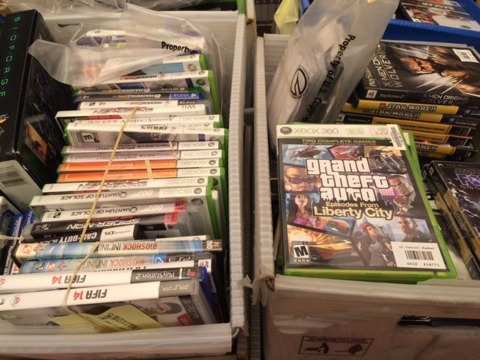
Even though countless games have been delayed from 2014 to 2015, we're about to hit the busiest part of the year. It's when games start getting thrown into a stack with a promise to play them later, only to have those promises broken over and over.
For me, I'll be bouncing between Sunset Overdrive and Call of Duty: Advanced Warfare for a tonal departure from October's deluge of horror. Of course, that means Bayonetta 2's being left in the rearview mirror, but I intend to get back around to that one, even if I have to take a day off work to make it happen. It's a different kind of game, but it reminds me of Asura's Wrath...
The real question is how Dragon Age: Inquisition fits into everything. I'm hoping to finally join the series with its latest release, but such a plan was drafted when it seemed like Dragon Age would arrive in September. While it may only be the beginning of November, I feel like the month's already gone...
You Should Read These

As video games begin to weave themselves into the cultural fabric, it becomes increasingly apparent what a terrible job the industry does of archiving its work. This isn't news, obviously, but as the Library of Congress begins to consider how games should be considered alongside movies, music, and other mediums, hearing how game companies are largely against handing over source code is disappointing. We can't play older games on our newer consoles for technological reasons that are sometimes understandable, but we should be looking for better ways to make sure our medium can be remembered in the decades to come. So far, we're screwing that up, but there's time to turn it around.
"More pressingly, the Moving Image Collection currently has no good way of dealing with digitally distributed media, and not just video games. The Library’s processes are, by the standards of 21st century media consumption, antiquated. Netflix has to print special VHS copies of their streaming hits like Orange Is the New Black and House of Cards for copyright consideration. As games move toward exclusively digital formats, the Library has to standardize digital specifications for fiber optic copyright submission, and then it needs the major game publishers to comply.
The Library has strong relationships with big film studios, who come to Packard for prints when they want to publish new editions. Many game publishers, though, see the archivists’ desire for comprehensiveness as a threat. 'Most game companies,' Gibson wrote in 2012, 'view the source codes as trade secrets not to be distributed.' That, according to Gibson, is a mistake, especially since the Library keeps all material under lock and key. 'Archives are trying to save and legitimize the things they’re making,' he said."

While this isn't about games, it touches on the problems of expanded speech on the Internet. There were several moments I became physically ill while reading Adrian Chen's piece about the psychological cost of content moderation in the social media age. Chen talks with the companies and employees tasked with making sure your grandma doesn't come across a dick pic on Facebook, and reveals the darkness of humanity that we're often never exposed to. Dick pics are nothing compared to what's described in Chen's piece. I've never recommended having a drink handy while reading something on Worth Reading before, but there's a first time for everything.
"While a large amount of content moderation takes place overseas, much is still done in the US, often by young college graduates like Swearingen was. Many companies employ a two-tiered moderation system, where the most basic moderation is outsourced abroad while more complex screening, which requires greater cultural familiarity, is done domestically. US-based moderators are much better compensated than their overseas counterparts: A brand-new American moderator for a large tech company in the US can make more in an hour than a veteran Filipino moderator makes in a day. But then a career in the outsourcing industry is something many young Filipinos aspire to, whereas American moderators often fall into the job as a last resort, and burnout is common.
'Everybody hits the wall, generally between three and five months,' says a former YouTube content moderator I’ll call Rob. 'You just think, ‘Holy shit, what am I spending my day doing? This is awful.'"
If You Click It, It Will Play
These Crowdfunding Projects Look Pretty Cool
- Sylvio is a ghost story about a voice recorder and a park covered in a thick, red fog.
- Mad Geniuswants to build a motion controller for every console. It's not looking good.
- Impact Winter is a game of survival set during a winter that shows no signs of ending.
Tweets That Make You Go "Hmmmmmm"
This tweet looks best at 30 fps.
— Markus Persson (@notch) October 28, 2014
PUT AN IMMEDIATE HALT TO ALL UNIVERSITY RESEARCH ON THE CONSTRUCTION OF THE ANTI-GAMER RAY
— Christine LOVELESS (@christinelove) October 28, 2014
The one time your Tweet makes it to the local news is when you've Halloweened your display name to a goofy Pokemon reference
— MissingNo. S. Burns (@mrwasteland) October 21, 2014
Be a person who strives to be interested in many things, not just one. Improve yourself. Resist being insular and living in an echo chamber.
— Chris 'October' Remo (@chrisremo) October 30, 2014
Hearing the words "ethics in gaming journalism" come out of Stephen Colbert's mouth was one of the more surreal moments in recent memory
— Slashly BOOurch (@ashly_burch) October 30, 2014
Oh, And This Other Stuff
- Danielle Riendeau highlights some free horror games to play, even though Halloween's over.
- Anita Sarkeesian writes about the future of video games for The New York Times.
- Film Crit Hulk tries to make sense of GamerGate.
- Maddy Myers calls for an end to the term "male gaze" and asks for more nuance.
- Mike Fahey laments the slow destruction of his favorite game hidden inside Call of Duty.
- Jay Hathaway reports on a black anime cosplayer who was shot in the back six times.
- David Gaider, lead writer of Dragon Age, on the idea games can't stand up to scathing criticism.
- Kat Bailey argues the 1994 version of X-Wing is way better than the 1998 version of X-Wing.
- Amy Knepper adored Child of Light's embracing of hope, even in life's darkest moments.
- PJ Vogt talks with the columnist behind IGN's influential Ask Leah column from years ago.
- Jamaal Ryan defends the right for ugly games like Hatred to exist.